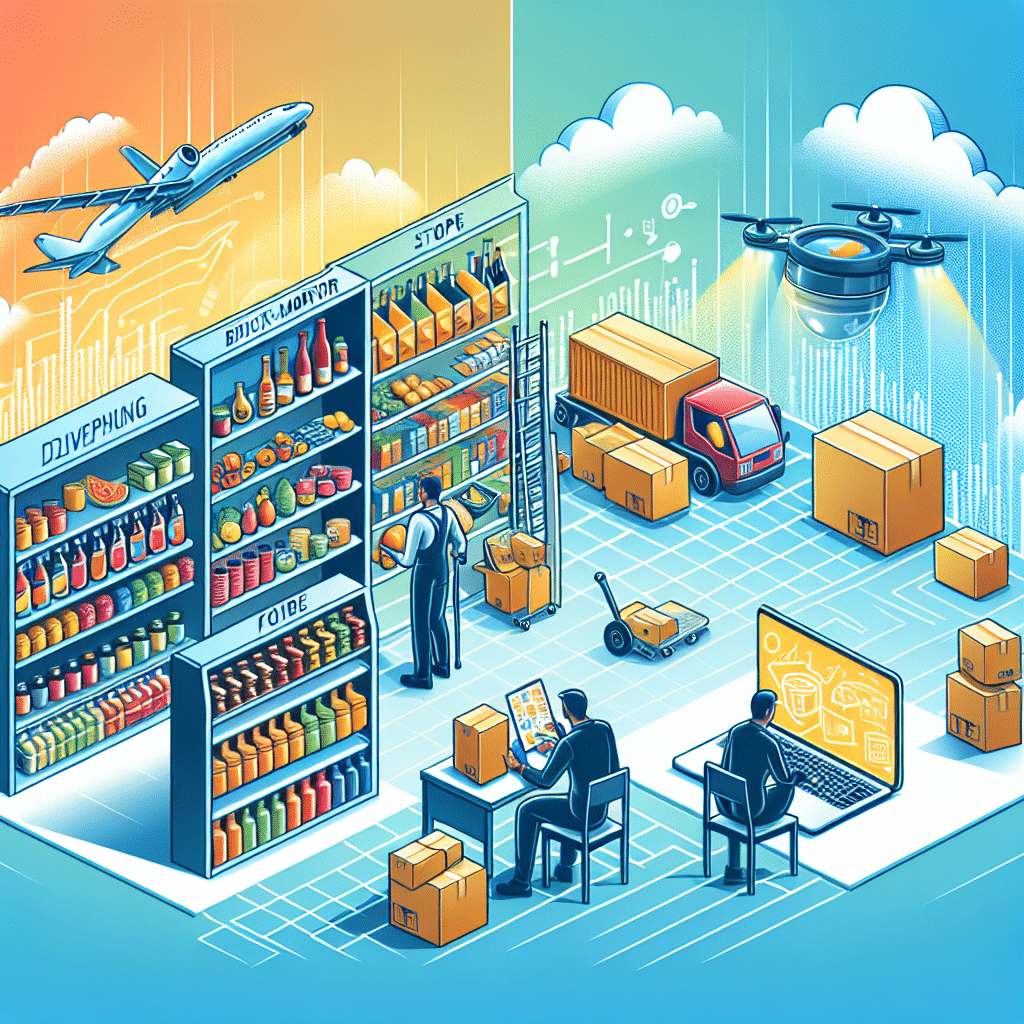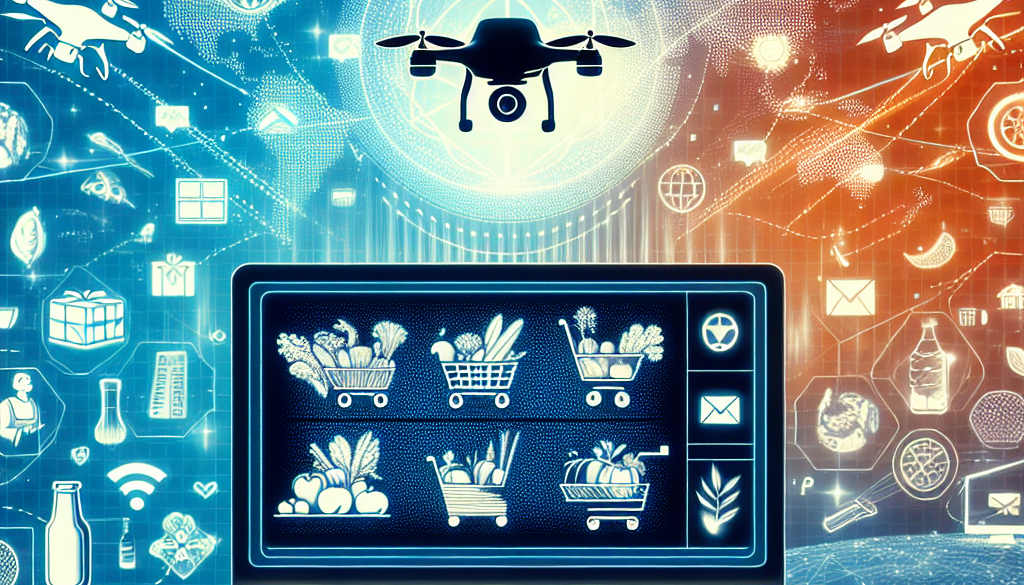Trends that are shaping E-commerce for the Food and Beverage Industry
-
Table of Contents
- E-Commerce Trends Revolutionizing the Food and Beverage Industry
- Personalization and Customization
- Mobile Shopping and Apps
- Sustainability and Ethical Practices
- Direct-to-Consumer (D2C) Models
- Augmented Reality (AR) and Virtual Reality (VR)
- Artificial Intelligence (AI) and Machine Learning
- Health and Wellness Focus
- Conclusion
- ETprotein: Enhancing Your Food and Beverage Offerings
E-Commerce Trends Revolutionizing the Food and Beverage Industry

The food and beverage industry has been undergoing a significant transformation, with e-commerce emerging as a powerful channel for sales and customer engagement. As consumer behavior continues to evolve, businesses within this sector are adapting to new trends that are shaping the future of online food and beverage shopping. This article explores the key trends influencing e-commerce in the food and beverage industry, providing valuable insights for businesses looking to stay ahead in a competitive market.
Personalization and Customization
One of the most significant trends in e-commerce for the food and beverage industry is the shift towards personalization and customization. Consumers are increasingly seeking products that cater to their individual preferences, dietary needs, and lifestyle choices. This trend is evident in the rise of subscription-based services offering personalized meal kits, curated snack boxes, and customized nutrition plans. By leveraging data analytics and customer feedback, businesses can tailor their offerings to meet specific consumer demands, resulting in higher customer satisfaction and loyalty.
Mobile Shopping and Apps
The proliferation of smartphones has made mobile shopping a critical component of e-commerce. Food and beverage companies are investing in mobile-friendly websites and dedicated apps to provide a seamless shopping experience. Features such as one-click ordering, location-based services, and real-time tracking are enhancing the convenience of purchasing food and beverages online. According to a report by eMarketer, mobile commerce sales are expected to account for over 70% of total e-commerce sales by 2024, highlighting the importance of a strong mobile presence for businesses in this sector.
Sustainability and Ethical Practices
Consumers are increasingly conscious of the environmental and ethical implications of their purchases. As a result, sustainability has become a driving force in e-commerce for the food and beverage industry. Brands that prioritize eco-friendly packaging, responsibly sourced ingredients, and transparent supply chains are gaining favor among shoppers. Additionally, companies that demonstrate a commitment to reducing food waste and supporting local communities are building strong reputations and customer loyalty.
Direct-to-Consumer (D2C) Models
The D2C model is gaining traction in the food and beverage industry, allowing manufacturers to bypass traditional retail channels and sell directly to consumers. This approach offers several advantages, including greater control over brand messaging, customer relationships, and pricing strategies. By selling directly, companies can also gather valuable first-party data to inform product development and marketing efforts. The D2C model is particularly popular among niche brands and startups looking to establish a direct connection with their target audience.
Augmented Reality (AR) and Virtual Reality (VR)
Emerging technologies like AR and VR are transforming the online shopping experience for food and beverage consumers. AR applications allow customers to visualize products in their own environment before making a purchase, while VR experiences can transport shoppers to virtual vineyards, breweries, or farms to learn about the origins of their food and drinks. These immersive technologies not only enhance the shopping experience but also help build brand stories and educate consumers about product features.
Artificial Intelligence (AI) and Machine Learning
AI and machine learning are playing an increasingly important role in optimizing e-commerce operations for the food and beverage industry. From chatbots that assist with customer service to algorithms that predict purchasing patterns, these technologies are improving efficiency and personalization. AI-driven recommendation engines can suggest products based on a customer’s past behavior, leading to higher conversion rates and more relevant shopping experiences.
Health and Wellness Focus
The health and wellness trend continues to influence consumer choices, with many shoppers seeking out products that support their well-being. E-commerce platforms are responding by offering a wider range of health-focused foods and beverages, including organic, non-GMO, gluten-free, and plant-based options. Brands that highlight the nutritional benefits of their products and provide transparent ingredient information are well-positioned to capture the attention of health-conscious consumers.
Conclusion
The food and beverage industry is at the forefront of e-commerce innovation, driven by trends such as personalization, mobile shopping, sustainability, D2C models, AR/VR, AI, and a focus on health and wellness. As these trends continue to evolve, businesses must adapt to meet the changing needs and expectations of consumers. By embracing these trends, companies can enhance their online presence, build stronger customer relationships, and achieve sustainable growth in the competitive e-commerce landscape.
ETprotein: Enhancing Your Food and Beverage Offerings
In line with the health and wellness trend, ETprotein offers a range of high-quality protein products that can help food and beverage companies cater to the growing demand for nutritious and sustainable options. Their organic bulk vegan proteins and L-(+)-Ergothioneine are ideal for businesses looking to expand their product lines with health-focused ingredients. With a commitment to non-GMO, allergen-free products, and high purity levels, ETprotein is well-equipped to support the e-commerce strategies of food and beverage brands.
About ETprotein:
ETprotein, a reputable protein and L-(+)-Ergothioneine (EGT) Chinese factory manufacturer and supplier, is renowned for producing, stocking, exporting, and delivering the highest quality organic bulk vegan proteins and L-(+)-Ergothioneine. They include Organic rice protein, clear rice protein, pea protein, clear pea protein, watermelon seed protein, pumpkin seed protein, sunflower seed protein, mung bean protein, peanut protein, and L-(+)-Ergothioneine EGT Pharmaceutical grade, L-(+)-Ergothioneine EGT food grade, L-(+)-Ergothioneine EGT cosmetic grade, L-(+)-Ergothioneine EGT reference grade and L-(+)-Ergothioneine EGT standard. Their offerings, characterized by a neutral taste, non-GMO, allergen-free attributes, with L-(+)-Ergothioneine purity over 98%, 99%, cater to a diverse range of industries. They serve nutraceutical, pharmaceutical, cosmeceutical, veterinary, as well as food and beverage finished product distributors, traders, and manufacturers across Europe, USA, Canada, Australia, Thailand, Japan, Korea, Brazil, and Chile, among others.
ETprotein specialization includes exporting and delivering tailor-made protein powder and finished nutritional supplements. Their extensive product range covers sectors like Food and Beverage, Sports Nutrition, Weight Management, Dietary Supplements, Health and Wellness Products, and Infant Formula, ensuring comprehensive solutions to meet all your protein needs.
As a trusted company by leading global food and beverage brands and Fortune 500 companies, ETprotein reinforces China’s reputation in the global arena. For more information or to sample their products, please contact them and email sales(at)ETprotein.com today.












